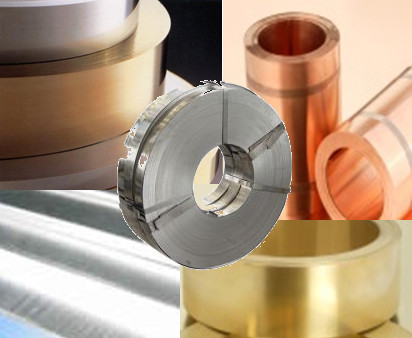Metal is yet another common component of sealing devices. In many cases, metal components are used to reinforce the non-metallic components of a sealing device. In addition, the metal can be the main sealing element, such as with a double-jacketed gasket. Therefore, having a general understanding of the properties and temperature and chemical resistance of metals is important.

Aluminum
- Excellent corrosion resistance to fresh and salt water
- Maximum recommended operating temperature is 800°F (472°C)
Brass
- Copper alloy typically used with non-oxidizing acids, alkaline, and neutral salt solutions
- Maximum recommended operating temperature is 500°F (260°C)
Carbon Steel
- Most common metal for double-jacketed gaskets
- Poor resistance to corrosion
- Not recommended for water or diluted acids
- Maximum recommended operating temperature of 1000°F (540°C)
Copper
- Used successfully in acetic acids, nitrates, and many organic chemicals
- Maximum recommended operating temperature of 600°F (316°C)
HASTELLOY B®
- Registered Trademark of Haynes International
- Corrosion-resistant alloy
- Resists hydrochloric acid, phosphoric acid, other halogen acids, and reducing conditions
- Maximum recommended operating temperature of 2000°F (1090°C)
HASTELLOY C®
- Registered trademark of Haynes International
- Alloy with exceptional resistance to severe oxidizing conditions in nitric acid, free chlorine, and strong aqueous and acid solutions
- Maximum recommended operating temperature is 2000°F (1090°C)
INCONEL®
- Registered trademark of Inco Alloys International, Inc.
- Excellent resistance to corrosion by halogen gases and compounds
- Withstands high temperatures; maximum operating temperature of 2000°F (1090°C)
MONEL®
- Registered trademark of Inco Alloys International, Inc.
- Excellent resistance to most acids and alkalines, except extremely oxidant acids
- Commonly used in hydrofluoric acid applications
- Maximum recommended operating temperature of 1500°F (820°C)
Nickel
- Resists caustic media and corrosion from neutral and distilled water
- Maximum recommended operating temperature of 1400°F (760°C)
Stainless Steel Type 304
- Widely used for industrial gasketing
- Excellent corrosion resistance
- Maximum recommended operating temperature of 1400°F (760°C)
Stainless Steel Type 316L
- Greater corrosion resistance than SS Type 304, due to added molybendum
- Maximum recommended operating temperature of 1400°F (760°C)
Stainless Steel Type 321
- Similar to SS Type 304, but has titanium added
- Widely used in high-temperature corrosive applications
- Maximum recommended operating temperature of 1400°F (760°C)
Stainless Steel Type 347
- Similar to SS Type 304, but has columbium and titanium added
- Good performance in high-temperature corrosive applications, to 1600°F (870°C)
Stainless Steel Type 410
- Martensitic stainless steel
- Heat-treatable, 12% chromium steel
- Good corrosion resistance, high strength
- Maximum recommended operating temperature of 1200°F (650°C)
Titanium
- Good resistance to wet chlorine and chlorine dioxide
- Not suitable for dry chlorine
- Maximum recommended operating temperature of 2000°F (1090°C)

